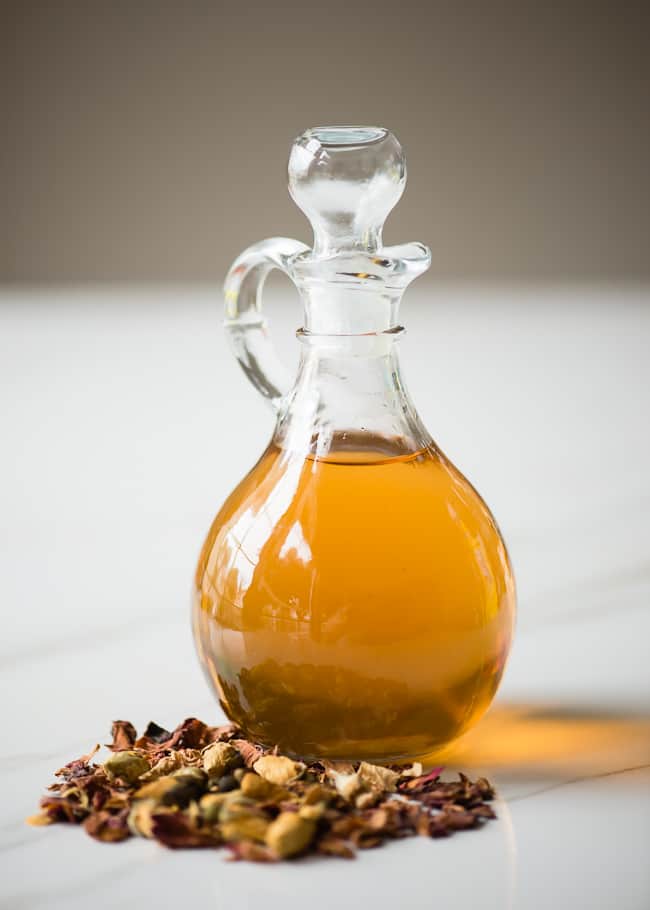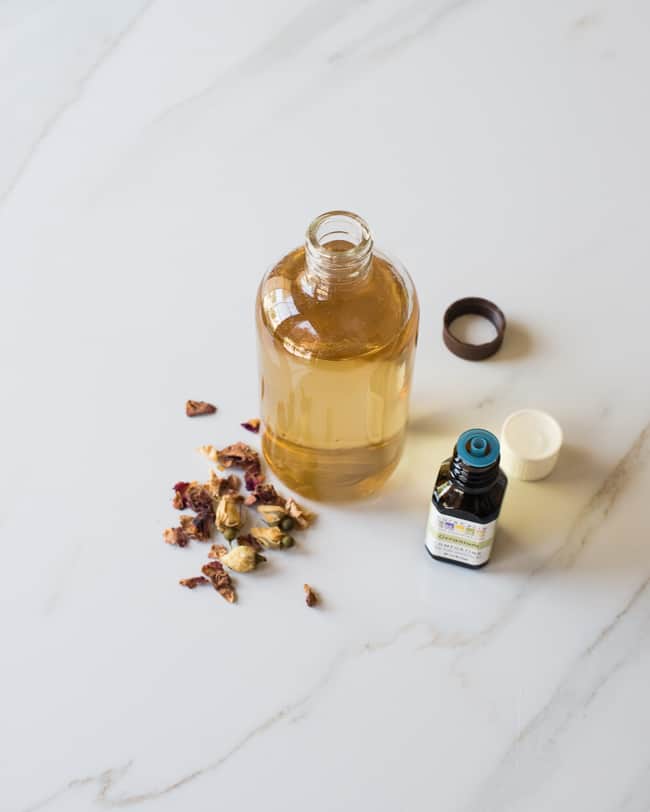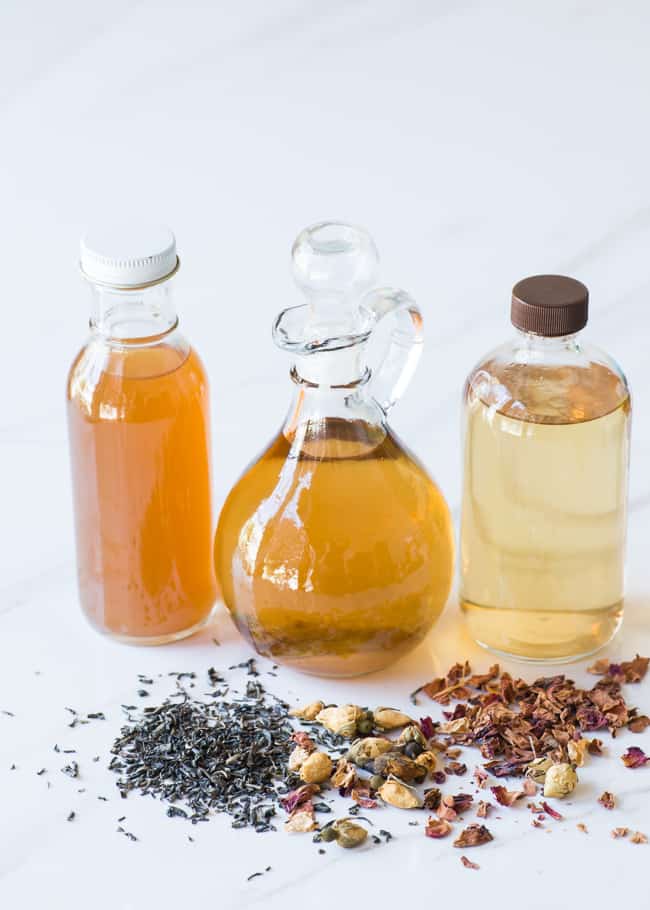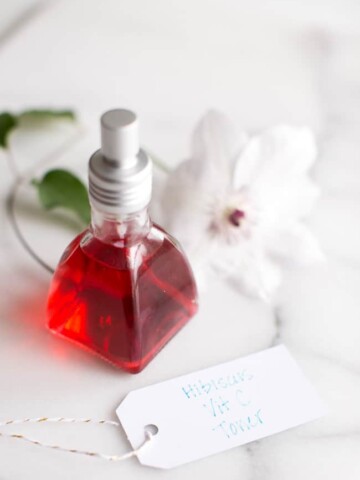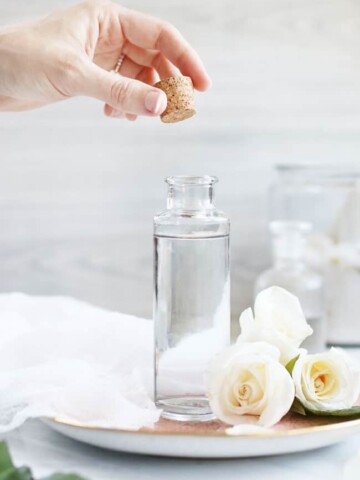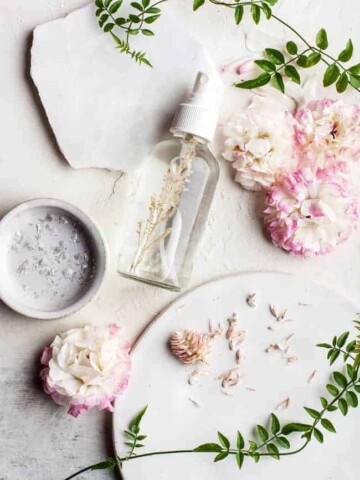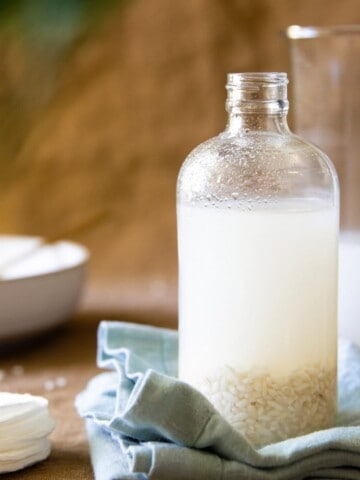Have you ever asked yourself if a toner is necessary in your skincare routine? Or is it safe and effective to make a DIY toner?
We'll clarify some misconceptions about the purpose of a toner—because depending on the type of skin you have, the reason you’ll use a toner will be different. And then we will show you how to make a gentle version that's safe for even the most sensitive skin.
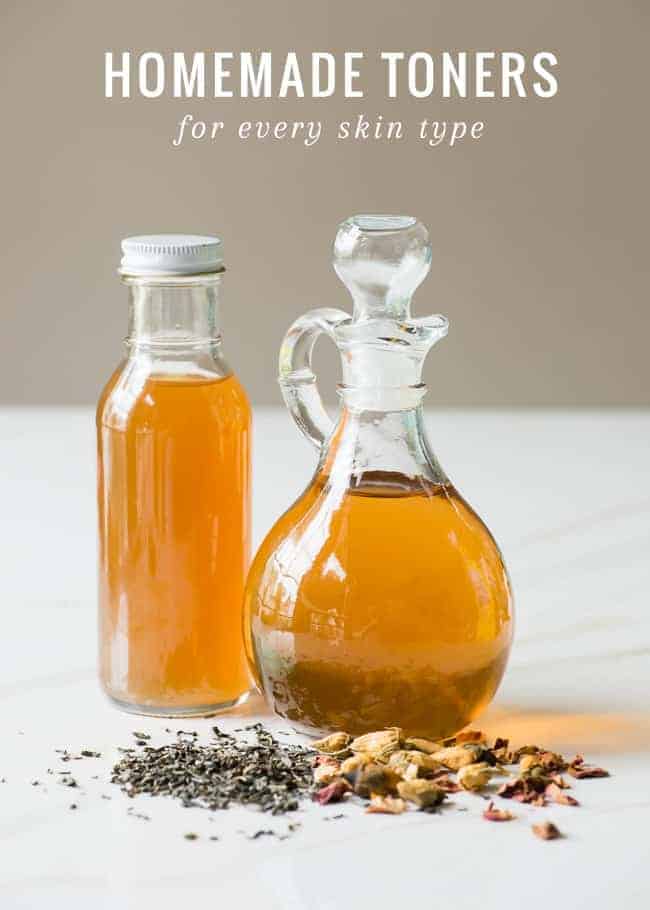
What does a face toner do?
If you have oily or acne-prone skin, you’re probably using a cleanser that is a little on the acidic or antibacterial side of the pH scale. But if you have dry or sensitive skin, you most likely are using a cleanser more on the alkaline or softening side. A toner helps equalize the skin’s pH after cleansing, bringing it back to its optimal level.
We want our skin to be at its natural pH as much of the time as possible. Due to the acid mantle, a protective layer on the surface of our skin, the pH typically should fall around a slightly acidic 5.5. When its pH is ideal, the skin can function best to protect and renew itself.
But it's not all about pH balance. Face toner helps to:
Remove leftover dirt, makeup, and oil. Like a second cleanser, toner helps remove the remains of makeup and grime that you may have missed the first go-around in your skincare regimen.
Hydrate skin. Spritzing toner directly on skin helps replenish moisture. Use it prior to applying moisturizer to help seal in the ingredients.
Make skin appear smoother. Toner can also be applied with an exfoliating cotton round to remove any build-up of dead skin cells.
Infuse the skin with extra vitamins and botanicals. Adding herbs, green tea, and essential oils provides skin with a boost of antioxidants, vitamins, and minerals.
Encourage your other skincare products to sink in. After using a pH-balancing toner, your skin will be best prepared to absorb the effective ingredients in your skincare regimen.
Does everyone need to use toner?
No, it really depends on your skin type. If your skin is naturally smooth and radiant, you can get away with using fewer products on your skin, including toner.
But if you have oily or acne-prone skin, toner can help balance it out, so it appears less oily. Or if your skin is lacking certain vitamins and minerals, it wouldn't hurt to give it a botanical boost or lock in extra moisture.
How to Make Your Own DIY Toner
The good news is it's 100% safe to make your own face toner. I’ve put together 3 great toner recipes you can make at home—find the right recipe for your skin type!
Toner for Oily and Acne-Prone Skin
Green tea is an anti-inflammatory that can help with redness and acne [source], while the apple cider vinegar will bring your skin’s pH back to a normal level.
- ¾ cup steeped green tea
- ¼ cup apple cider vinegar
After steeping a green tea bag in hot water, bring the tea to room temperature then discard the tea bag. Add the apple cider vinegar and mix. You can apply with a cotton ball, or spritz with a spray bottle. Store the remainder in the refrigerator for no longer than 10 days.
Face Toner for Sensitive Skin
Rose water is an antioxidant [source] that not only balances skin, but it’s also soothing and hydrating for irritated, sensitive skin. Because it's so gentle, it's the perfect DIY toner for all skin types.
- ½ cup dried rose buds
- hot filtered water
Pour the water over the rose buds and let sit for 1–2 hours. Use a strainer to separate the rose buds out from the rose water. I recommend spritzing this rose water on your face twice a day after cleansing.
If you make your own rosewater, you will want to store it in the refrigerator and use within 7–10 days. If you prefer store-bought, just follow storage instructions on the label. (And in case you're wondering, this is my favorite store-bought rosewater.)
Toner for Dry Skin
- Rose water (see recipe above)
- Geranium essential oil
Using the recipe above to make rose water, just add a few drops of geranium oil for added hydration. Be sure to shake the spray bottle well before spritzing this toner on dry skin. Store it in the refrigerator, and use it within 7–10 days.
Face Toner FAQ
When should I apply face toner?
I recommend applying your DIY toner twice a day, just after cleansing your skin, but before applying your other skincare products.
Spritz it on directly or apply a light layer using a cotton ball, then allow it to sink in for about a minute. Before it's had a chance to completely dry, apply your serum and then moisturizer to lock in the nutrients.
Can I use face toner on my body?
Yes, definitely. These DIY toners are gentle enough to help tame razor burn or soothe “bacne.” But you might want to do a spot test to make sure you don't have an adverse reaction (apple cider vinegar can sometimes irritate sensitive skin).
Is toner supposed to burn?
Honestly, it depends on the ingredients. Apple cider vinegar has been known to sting, especially if you have sensitive skin. If you notice redness or a burning sensation, go ahead and add more water or green tea to dilute your toner. Or switch to one of the rose water toners, which shouldn't burn or irritate skin.
Can I add a preservative to make my toner last longer?
You can, if you like, although I haven't tried it myself. If you choose to experiment with a preservative, I recommend using a natural one like grapefruit seed extract to keep your toner as clean as possible.
You can also make extra toner ahead of time and freeze it in an ice cube tray. Thaw the toner one ice cube at a time and store it in the fridge for up to a week.
What's a good DIY toner for normal skin?
Straight witch hazel is great for normal skin. You can also make a toner of plain green tea (without the ACV) if you want the anti-aging and antioxidant benefits of tea [source] without the astringent effects of vinegar.
Am I supposed to wash the toner off?
Nope! No need to. You’ll want to give it ample time to sink in, so the ingredients can nourish the outer layer of skin.
Boost your skincare routine with more DIY face toners
- How to Make a Rosewater Facial Toner
- 5 Ways to Make Toner with Witch Hazel
- Homemade Firming Antioxidant Vitamin C Citrus Toner
- Homemade Toner Recipe for Your Face with Fennel
Do you currently use a toner daily? Is it something you'd like to give a try?
This post was medically reviewed by Dr. Jennifer Haley, a board-certified dermatologist with extensive experience in medical, cosmetic, and surgical dermatology. Learn more about Hello Glow’s medical reviewers here. As always, this is not personal medical advice, and we recommend that you talk with your doctor.
Photos by Lindsey Rose Johnson
580
